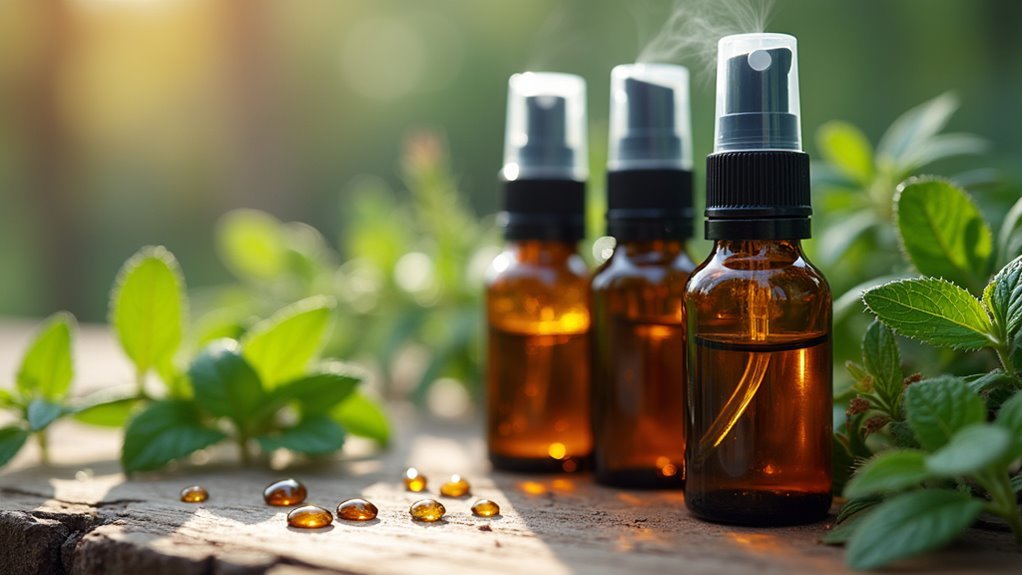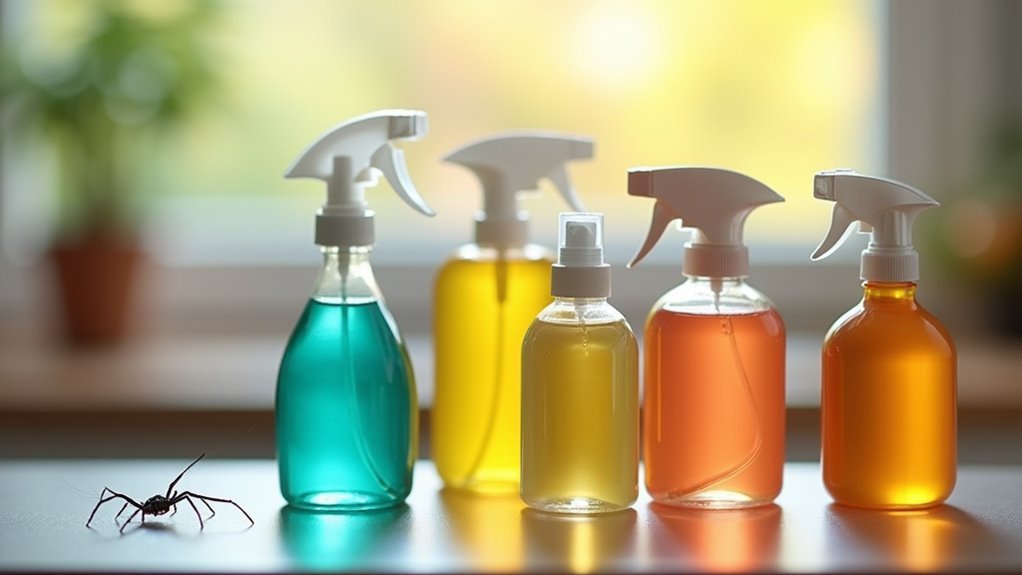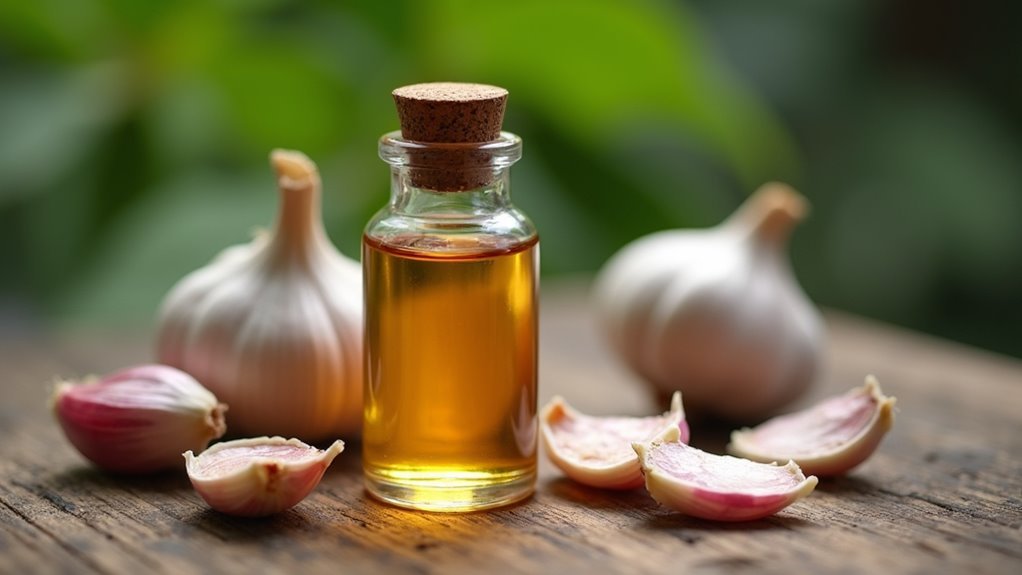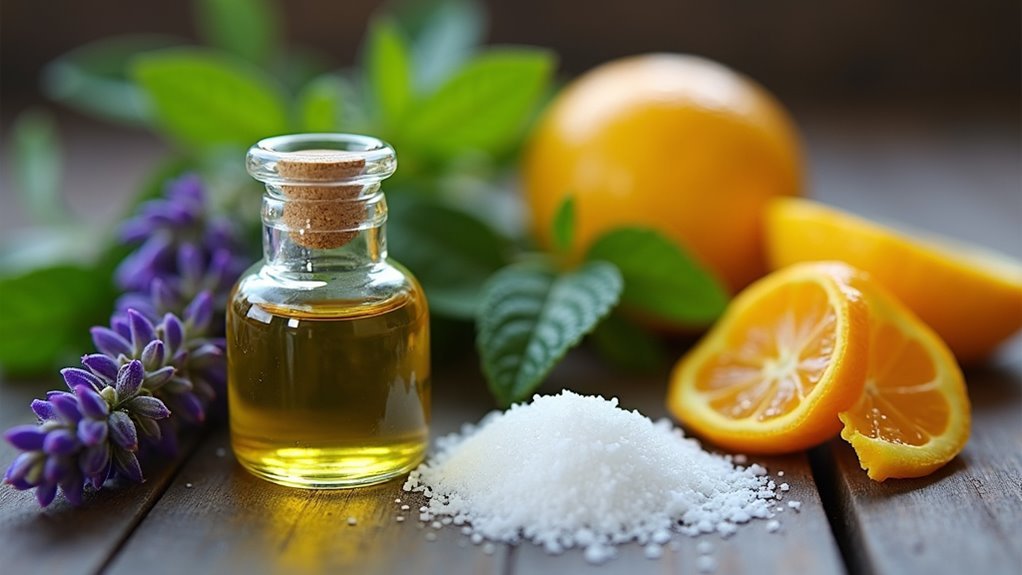You can effectively repel spiders using proven natural ingredients that target their sensory systems. Peppermint, cinnamon, tea tree, and lavender essential oils disrupt spiders’ receptors, while white vinegar’s acetic acid breaks down their navigation systems. Liquid soap acts as a surfactant that penetrates their exoskeletons, and citrus peels create acidic environments spiders avoid. Garlic extract’s sulfur compounds provide additional deterrence. Combining these ingredients with alcohol enhances penetration and creates a multi-faceted approach that’ll maximize your spider control success.
Essential Oils That Keep Spiders Away

When you’re looking for natural spider deterrents, essential oils offer one of the most effective and aromatic solutions available.
Peppermint essential oil stands out as a powerhouse ingredient for your natural spider spray, effectively disrupting spiders’ sensory receptors while simultaneously deterring other insects.
Peppermint oil disrupts spiders’ sensory systems while creating a dual-action barrier against multiple household pests.
Cinnamon oil proves even more potent, with research showing it can repel spiders and kill them on direct contact.
Tea tree oil provides another reliable option with its strong scent profile.
While lavender oil isn’t as powerful as peppermint or cinnamon, it still helps repel spiders while leaving your home pleasantly fragrant.
These essential oils work by overwhelming spiders’ sensitive smell receptors, making treated areas uninhabitable for these unwanted guests.
Why Vinegar Works as a Spider Deterrent
While essential oils provide excellent natural spider control, vinegar offers an equally powerful yet more affordable alternative that’s likely already sitting in your kitchen pantry.
Vinegar’s effectiveness stems from its acetic acid content, which disrupts spider sensory receptors and makes navigation difficult. The pungent odor alone causes spiders to retreat from treated areas, while direct contact proves lethal by breaking down their exoskeletons and causing dehydration.
Here’s why vinegar works so effectively:
- Sensory disruption – Acetic acid interferes with spider navigation systems
- Natural repellent – Strong odor creates an unwelcoming environment
- Direct elimination – Contact breaks down exoskeletons and dehydrates spiders
- Preventive barrier – Regular application stops web establishment
Mix equal parts vinegar and water to create an effective deterrent spray that’ll prevent spiders from settling in your home.
The Science Behind Soap in Spider Sprays

Another key ingredient that dramatically amplifies your homemade spider spray’s effectiveness is liquid soap. When you add soap to your spider sprays, it functions as a surfactant that reduces water’s surface tension, allowing the solution to better penetrate spider exoskeletons and adhere to their bodies.
This creates a suffocating film that disrupts their respiratory system upon direct contact.
Castile or dish soap works particularly well among natural ingredients because it breaks down oils and residues on spiders, making them more vulnerable to other active components in your spray.
Dish soap breaks down spider oils and residues, making these pests more susceptible to your spray’s active ingredients.
The soap also helps your solution cling to surfaces where spiders hide, increasing contact likelihood.
This combination creates an effective spider control method that traps and eliminates these pests through suffocation.
Citrus-Based Ingredients for Spider Control
Since citrus peels and essential oils contain natural compounds that overwhelm spiders’ sensitive chemical receptors, they’ve become one of the most popular natural deterrents for spider control.
These citrus-based ingredients create an acidic environment that spiders actively avoid, making your home less inviting to eight-legged visitors.
When you’re creating homemade spider sprays, citrus extracts effectively disrupt spiders’ sensory systems while leaving your space smelling fresh. The essential oils from lemon and orange peels don’t just repel spiders—they also serve as excellent cleaners.
Key benefits of citrus spider deterrents:
- Dual-purpose cleaning – Acts as both repellent and household cleaner
- Natural acidic barrier – Creates hostile environment spiders avoid
- Sensory disruption – Interferes with spiders’ chemical detection systems
- Pleasant fragrance – Leaves fresh scent while deterring pests
Remember to reapply regularly for maximum effectiveness.
Garlic Extract as a Natural Spider Repellent

You’ll find garlic extract’s powerful sulfur compounds create a strong odor that naturally repels spiders due to their heightened sensitivity to intense scents.
When you prepare a garlic-based spray by blending four cloves into a paste, infusing it in water for 24 hours, and straining before bottling, you’re creating an effective deterrent that prevents spiders from establishing webs in treated areas.
This natural solution works best when you reapply it every two weeks and can be safely used around pets and children with proper moderation.
Garlic’s Anti-Spider Properties
Garlic’s potent sulfur compounds create a pungent odor that spiders absolutely despise, making this common kitchen staple one of nature’s most effective spider deterrents.
This natural spider repellent works by masking scents that typically attract spiders, disrupting their hunting and mating patterns. Unlike harsh chemical alternatives, garlic provides a non-toxic solution that’s completely safe around your family and pets.
Key benefits of garlic-based spider control:
- Easy preparation – Simply blend garlic cloves with water and steep for 24 hours
- Eco-friendly formula – Non-toxic ingredients won’t harm children or pets
- Cost-effective solution – Uses affordable kitchen ingredients you likely already have
- Proven effectiveness – Sulfur compounds naturally repel spiders from treated areas
Reapply your garlic spray every two weeks to maintain peak protection as the scent naturally dissipates over time.
Application and Effectiveness
When properly prepared and applied, garlic extract spray becomes a powerful weapon in your natural pest control arsenal. You’ll need to spray this natural spider spray around entry points, windowsills, and spider habitats for maximum effectiveness. The application requires consistent coverage every two weeks to maintain potency.
| Application Area | Frequency |
|---|---|
| Entry points | Every 2 weeks |
| Window frames | Every 2 weeks |
| Door thresholds | Every 2 weeks |
| Spider webs | As needed |
| Outdoor corners | After rain |
The effectiveness varies by spider species and environmental conditions. Unlike peppermint essential oil, garlic extract’s potency diminishes faster outdoors. You’ll achieve better results combining multiple natural repellents rather than relying solely on garlic extract for thorough spider control.
How Alcohol Enhances Spider Spray Effectiveness
When you add alcohol to your spider spray, you’re creating a powerful contact killer that works immediately upon hitting the spider.
The alcohol acts as a solvent that helps your spray penetrate surfaces more effectively, reaching spiders hiding in cracks and crevices where water-based sprays might fail.
You’ll notice faster results because alcohol dehydrates spiders on contact while helping other active ingredients in your mixture work more efficiently.
Alcohol’s Contact Killing Power
Isopropyl alcohol destroys spiders through direct contact by breaking down their protective outer layer, causing rapid dehydration and death within seconds. This contact killer mechanism makes alcohol one of the most effective immediate solutions for spider problems you’ll encounter.
When you spray alcohol directly on spiders, it penetrates their exoskeleton and disrupts their body’s moisture balance. The alcohol also enhances other ingredients like essential oil by increasing their penetration power, creating a more potent formula.
Key benefits of alcohol’s contact killing power:
- Instant results – Kills spiders within seconds of direct application
- Enhanced penetration – Boosts effectiveness of other spray ingredients
- Web destruction – Dissolves spider webs and egg sacs on contact
- Clean evaporation – Leaves minimal sticky residue compared to alternatives
Enhanced Spray Surface Penetration
Beyond its immediate killing power, alcohol transforms your spider spray into a far more effective solution by dramatically improving how other ingredients penetrate spider defenses.
When you create a homemade spider repellent, alcohol acts as a powerful solvent that breaks down the protective oils and waxes coating a spider’s exoskeleton. This enhanced spray surface penetration allows active ingredients to reach vulnerable areas that water-based solutions simply can’t access.
The alcohol’s solvent properties create pathways through the spider’s natural barriers, ensuring your spray delivers maximum impact.
You’ll also benefit from alcohol’s emulsifying abilities, which distribute other ingredients uniformly throughout the mixture. This creates a more potent, well-balanced spider spray that maintains consistent effectiveness across every application, giving you superior results compared to traditional water-based alternatives.
Plant-Based Ingredients That Spiders Avoid
Why reach for harsh chemicals when nature provides powerful spider deterrents right in your garden? These plant-based ingredients offer safe, effective alternatives that won’t harm your family or pets while keeping spiders away.
Top Natural Spider Repellents:
- Peppermint oil – Disrupts spiders’ sensory perception with its strong scent
- Lavender – Contains linalool that spiders find unappealing
- Basil – Works as both culinary herb and natural spider deterrent
- Garlic – Creates pungent odor spiders actively avoid
You can grow these plants near entry points or create homemade sprays by infusing them in water.
Peppermint oil proves especially potent in commercial spider-repelling formulas.
Lavender adds garden beauty while protecting your space.
Basil strategically placed around doorways creates natural barriers.
Garlic-infused sprays provide budget-friendly protection that’s completely safe around children.
Combining Ingredients for Maximum Repellent Power
While individual plant-based ingredients offer solid spider protection, combining them strategically multiplies their repelling power and creates formulations that both deter and eliminate spiders on contact.
You’ll maximize effectiveness by mixing 30 drops of cinnamon essential oil with vinegar and liquid soap—this combination kills spiders instantly while repelling others. The soap enhances adhesion, keeping the solution on surfaces longer.
For tackling spider infestation at its source, blend garlic extract with soap to disrupt egg cycles.
Your DIY spider spray becomes even more powerful when you incorporate multiple natural ingredients like diatomaceous earth, basil, and lavender.
This multi-faceted approach doesn’t just keep spiders at bay—it eliminates them through various mechanisms, creating thorough protection throughout your home.
Safety Considerations for Natural Spider Spray Ingredients
Though natural spider repellents offer a safer alternative to chemical pesticides, you’ll need to exercise caution when handling and applying these ingredients to protect your family and pets.
Essential oil-based sprays require particular attention since cinnamon and peppermint oils can irritate skin and mucous membranes. These natural ingredients pose serious risks to cats and dogs, so you’ll want to apply sprays when pets aren’t present and store them safely out of reach.
Keep essential oil sprays away from pets and children, as cinnamon and peppermint oils can cause skin irritation and serious health risks.
Key safety considerations include:
- Test vinegar-based solutions on small surface areas first to prevent damage from acidity
- Choose fragrance-free liquid soap to minimize allergic reactions
- Keep cinnamon essential oil sprays away from children and pets during application
- Consult medical professionals if you have specific sensitivities to natural ingredients
Frequently Asked Questions
What Is the Best Spider Repellent That Actually Works?
You’ll find peppermint essential oil works best as a spider repellent. It’s scientifically proven to deter spiders effectively. You can also use vinegar for immediate contact killing or try commercial products like Mighty Mint for reliable results.
What Is Proven to Repel Spiders?
You’ll find peppermint and cinnamon essential oils effectively repel spiders through scent disruption. Vinegar-soap mixtures kill them on contact, while diatomaceous earth creates deadly physical barriers. You must reapply these natural solutions regularly.
What Is the Best Chemical to Keep Spiders Away?
You’ll find peppermint oil works best for keeping spiders away naturally. It disrupts their sensory perception effectively. For stronger chemical options, you can use pyrethroid-based commercial sprays, though they’re less safe around pets and children.
What Do Professionals Use to Spray for Spiders?
Professionals use synthetic pyrethroids like bifenthrin and lambda-cyhalothrin for fast-acting, long-lasting spider control. They’ll also apply barrier sprays around your home’s entry points and combine chemical treatments with eco-friendly essential oil formulations.
In Summary
You’ve got plenty of effective natural options for keeping spiders away. Essential oils like peppermint and tea tree, vinegar, soap, citrus peels, garlic extract, and rubbing alcohol all work to deter these eight-legged visitors. You’ll get the best results when you combine multiple ingredients and reapply regularly. Don’t forget to test any spray in a small area first and keep these natural repellents away from pets and children for everyone’s safety.





Leave a Reply